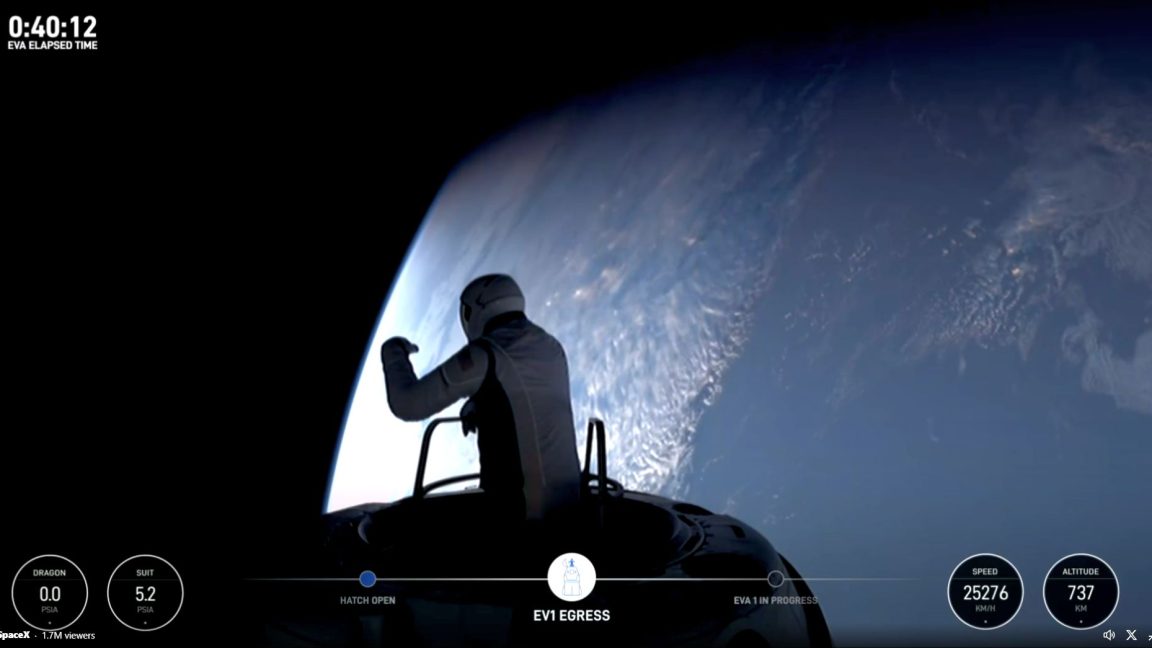
NASA nominee previews his vision for the agency: Mars, hard work, inspiration
arstechnica.com
Mars in focus NASA nominee previews his vision for the agency: Mars, hard work, inspiration Jared Isaacman says NASA should invest a "reasonable amount of resources" in Mars. Eric Berger Feb 17, 2025 10:39 am | 31 Jared Isaacman emerges from the Dragon spacecraft on Thursday morning. Credit: SpaceX webcast Jared Isaacman emerges from the Dragon spacecraft on Thursday morning. Credit: SpaceX webcast Story textSizeSmallStandardLargeWidth *StandardWideLinksStandardOrange* Subscribers only Learn moreThe likely next leader of NASA, private astronaut and pilot Jared Isaacman, has kept a low profile since the announcement last year that he was President Donald Trump's choice to lead the space agency.This is understandable, as Isaacman must still be confirmed by the US Senate. No date has yet been put forward for a confirmation hearing before the Senate Commerce, Science, and Transportation Committee, which is chaired by Sen. Ted Cruz (R-Tex.). Typically, during this interim period, nominees meet with Senators behind closed doors before their hearings and limit public comments that could put them in the hot seat during the confirmation process.This has meant that we've heard little from the person who is in line to lead NASA over the next four years as the space agency confronts a number of issues. These include reconfiguring the Artemis Program, a potential pivot toward Mars, an aging International Space Station, Mars Sample Return, a limited pipeline of science missions, and the likelihood of budget cuts. On top of all of this there is the uncertainty and unease federal workers face as the Trump Administration scrutinizes their activities for efficiency and, in some cases, loyalty.Breaking his silenceHowever, Isaacman made some of his most in-depth remarks yet on his vision to lead the space agency this weekend on the social media site X. Commenting on an image of Mars, it is notable that Isaacman chose to focus on the benefits of sending humans to the red planet."When I see a picture like this, it is impossible not to feel energized about the future," he wrote. "I think it is so important for people to understand the profound implications of sending humans to another planet."Among these, Isaacman cited the benefits of advancing state-of-the-art technologies including propulsion, habitability, power generation, in-situ resource utilization, and manufacturing."We will create systems, countermeasures, and pharmaceuticals to sustain human life in extreme conditions, addressing challenges like radiation and microgravity over extended durations," he said. "These advancements will form the foundation for lower-cost, more frequent crewed and robotic missions across the solar system, creating a flywheel effect to accelerate world-changing discoveries."Additionally, Isaacman said taking the first steps toward humanity living beyond Earth was critical to the long-term survival of the species, and that such an achievement would inspire a new generation of scientific and technological leaders."Achieving such an outrageous endeavorlike landing American astronauts on another planetwill inspire generations of dreamers to build upon these accomplishments, set even bolder goals, and drive humankinds greatest adventure forward," he wrote.Upon being asked about his thoughts about sending humans to Mars during the launch window in late 2028 or early 2029, Isaacman said he remains on the outside of NASA's planning process for now. But he did say the United States should start to put serious effort toward sending humans to Mars."We should invest a reasonable amount of resources coupled with extreme work intensity and then make them a reality," he wrote. "Even getting 90% there in the near term would set humankind on an incredible trajectory for the long term."NASA needs a leaderIn his comments Isaacman was careful to offer an uplifting and inclusive message. This has been his approach since his arriving in the space community about five years ago, with the Inspiration4 mission in 2021, and Polaris Dawn last year. He has sought to inspire people to be interested in space, advance commercial spaceflight, and broaden access. With his two Crew Dragon missions, Isaacman brought a variety of people to space and raised funds for charity. He is broadly liked within the space community for these reasons.Some critics have raised concerns about conflicts of interest, as Isaacman has paid hundreds of millions of dollars to SpaceX for his two flights. Will he unduly favor the spaceflight company founded by Elon Musk as leader of NASA? There is also hope within the space community, as well as NASA itself, that Isaacman can bring dynamic leadership and ease the considerable uncertainty hanging over the space agency at present. The NASA employees I have spoken with, almost universally, would welcome his confirmation sooner rather than later.Although Isaacman's remarks this weekend were general in nature, we can draw some information from them. First of all, Isaacman does not appear to be foreclosing on the idea of a lunar component for NASA's deep space exploration program. He mentions "Moon to Mars" in his comments. However it is likely that NASA's lunar program will become more focused, with the goal of learning what we can on the Moon to support human missions to Mars.As for Mars itself, it seems clear the Isaacman's spaceflight goals align with those of Trumpwho, despite creating the Artemis lunar program during his first term, has always been more interested in sending humans to Marsand Musk, who founded SpaceX with the express purpose of putting humans on Mars.Eric BergerSenior Space EditorEric BergerSenior Space Editor Eric Berger is the senior space editor at Ars Technica, covering everything from astronomy to private space to NASA policy, and author of two books: Liftoff, about the rise of SpaceX; and Reentry, on the development of the Falcon 9 rocket and Dragon. A certified meteorologist, Eric lives in Houston. 31 Comments
0 Comentários
·0 Compartilhamentos
·98 Visualizações


